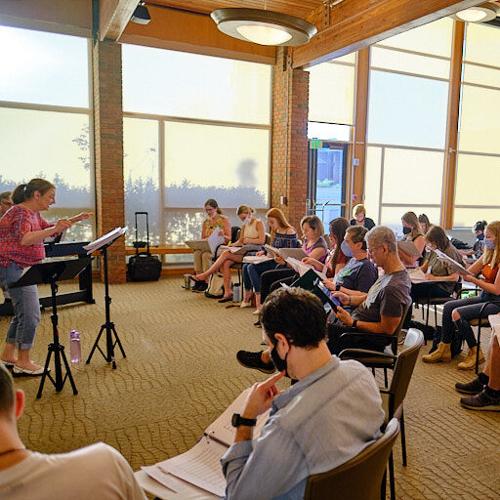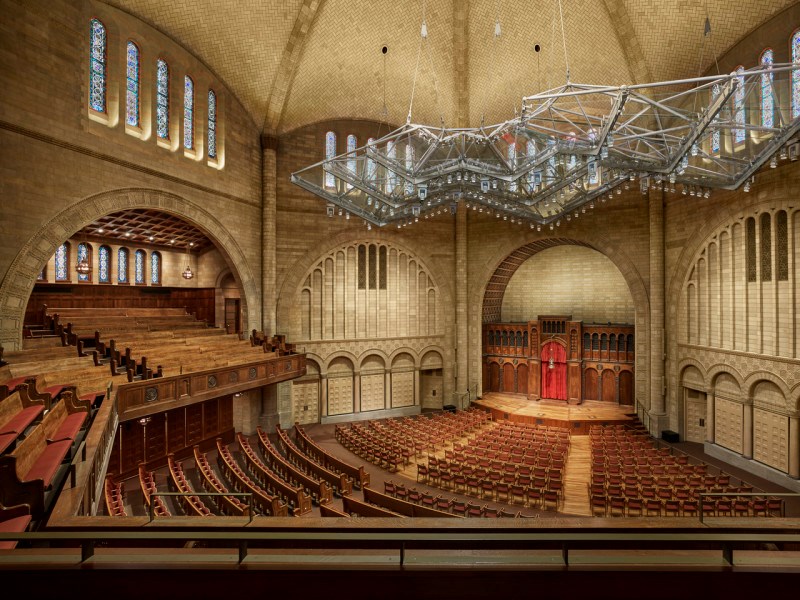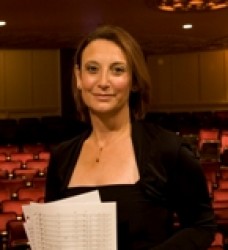by Mike Telin

“That was around the time that Joseph and the Amazing Technicolor Dreamcoat was popular. So after we did ‘Joseph’ there was nothing left, so they commissioned young people to write some things,” Mansfield recalled during a Zoom conversation from her office at the Case Western Reserve School of Law where she is a senior instructor. “So I wrote this 45-minute piece with a guitar, piano, and little ensemble. That was The Job Story.”
On Thursday, June 9 at 7:30 pm, The Sparks Fly Upward will receive its Cleveland premiere at the Maltz Performing Arts Center. Written and composed by Cathy Lesser Mansfield, directed by Jeffrey Lesser, conducted by Daniel Singer and featuring Cantor Kathy Wolfe Sebo, the opera recounts the story of three German families, two Jewish and one Christian, who find themselves thrust into the midst of the Holocaust. Additional performances are on Friday and Saturday at 7:30 pm and Sunday at 2:00 pm Tickets for both in person attendance and the simulcast are available online.
The opera begins on October 28, 1938 with the deportation of Polish Jews living in Germany to Poland, and concludes with the liberation of Berlin in May 1945 and the re-dedication of the Neue Synagogue in Berlin in 1995. At times the families turn to the Book of Job for diversion, reassurance and enlightenment. Job’s suffering, and the contest between good and evil represented in his story, are reflected in the lives of the characters, who boldly face the question of man’s obligation to man in times of moral and political crisis. The Sparks Fly Upward is told completely through music and lyrics. Read a synopsis here.
While growing up in Cleveland, Mansfield was always involved in music — she was a member of The Singing Angels, and by her own admission, didn’t pay much attention to academics. After spending a year as a composition and theory major at the University of Cincinnati College-Conservatory of Music, she transferred to NYU and studied acting at The Lee Strasberg Theatre & Film Institute for a semester. Being in New York City and seeing social inequities every day, Mansfield said she was bitten by the social bug.
“I made what I call a sharp right turn and ended up majoring in political science,” she said. “But I had a professor who taught philosophy and had also played trumpet for the Glenn Miller Orchestra, and he was very influential. So I graduated with a Political Science degree with a minor in music.”
It wasn’t until giving birth to twins in 1994 that Mansfield returned to that 45-minute piece from 1977. “While the twins were napping, I started to notate it,” she said. “We had this nanny who said I should turn it into a story about the Holocaust, but I thought no.”
Still, that idea piqued her interest. “I am Jewish and the Holocaust has always been present in my life, so I started doing some research and it was like I was off to the races. I felt it was my calling to finish the piece.”
Although it took from 1994 until 2005 to get the opera into “workshop shape,” Mansfield was able to start honing the piece at Drake University in Iowa where she was on the law faculty. It just so happened that the Quad Cities were having an Anne Frank exhibit and they asked to have the part that was finished performed. That amounted to 45 minutes.
“It wasn’t staged, but we had a full orchestra and narration between the musical numbers. And after it was over the President of the University and my Dean came up and said that it was an important piece and how long would it take to finish? I said I would need a year of focused time. And God bless Drake University — they gave me a paid year off to write the opera, for which I will be eternally grateful.”
During this time Mansfield said she made many research trips to Holocaust archives. “I went to Berlin three times and met with historians while at the same time writing and orchestrating the music.” The Sparks Fly Upward received its premier in 2008 to a sold- out house and rave reviews.
Although there was interest in the opera, for various reasons subsequent performances never materialized until Mansfield moved back to Cleveland in 2018. “I was having dinner with my friend Kathy Sebo who’s the Cantor at The Temple – Tifereth Israel. I told her she would make a good Lina. We started planning and were ready to Rock & Roll when COVID hit.”

“What’s beautiful about staging it in the Maltz is that it still has the Ark. There are two scenes that take place in a Synagogue so all we need to do is to stand in front of it. There’s also a scene that takes place on Kristelnacht – so it is a perfect space for this piece.”
Now that ten years have passed, how have Mansfield’s thoughts about the Opera evolved?
“It has kind of gone through two iterations,” she said. “After the 2008 performance I interviewed all of the principals in the orchestra and asked for their opinions — which led to some re-orchestrating. And during the opera there are places where the family is in hiding and they read the Book of Job to each other. While that is happening, so are the arrests of the Jews in Berlin and these two things are happening in parallel. We couldn’t do this in Des Moines, but here Jeff (Lesser) has had T. Paul Lowery, the set designer, build two platforms. Since the Maltz stage is bigger we are able to show the juxtaposition of the two scenes in a more real way.”

There is a Cleveland connection in the plot. “I was careful to make everything historically accurate. I have five bookshelves of Holocaust history and a half shelf of Cleveland Jewish history. But I found out that the character the woman in Berlin wrote to in Cleveland is the grandmother of my best friend growing up. So yeah, it does have a Cleveland presence, and I didn’t add it just for this production.”
And the music? “It’s very tonal and should not deter people who think they don’t like contemporary opera.”
Although the story is a sad one, Mansfield said that it is also hopeful. “It’s about three families and how they manage to keep each other going. I decided to make that the theme of the opera because everything I read talked about all of these little kindnesses that gave people hope.”
Published on ClevelandClassical.com June 7, 2022.
Click here for a printable copy of this article



